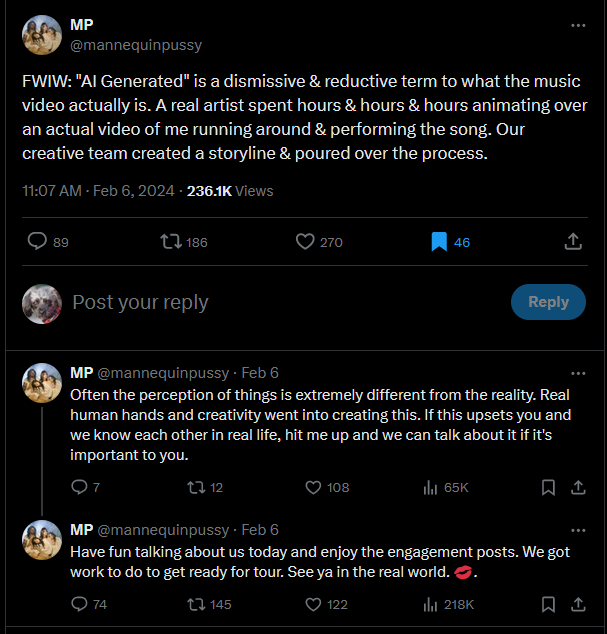Early February of 2024 the alt rock band Mannequin Pussy published the music video for their song “Nothing Like.” The video features heavy use of AI-generated images rotoscoped over actual footage of one of the band members performing in the video. The video released to harsh public criticisms principally from fans of the band as well as the visual artist and filmmaker communities who felt that Mannequin Pussy had resorted to AI generation instead of hiring and paying for real artists.
Mannequin pussy tweeted in response to the criticisms calling them “dismissive & reductive.” They clarified that the video was not entirely AI-generated, that the production of the video took a great deal of work and creative effort, and that the use of AI in the video was something done with artistic intent rather than as a cheap alternative to hiring artists. In short, the jankiness of AI-generated images was part of the artistic vision for the music video.
Mannequin Pussy is not the first artist to produce a music video using AI image generation nor will they be the last.
A much more egregious example which released to similar controversy was Idles’ “Grace” music video which also rotoscopes over video but rather than using original film stock uses footage from Coldplay’s “Yellow” music video.
This along with the recent release of OpenAI’s scarily realistic Sora text-to-video AI software has reopened questions about the ethics and practicality of AI. Can AI be used ethically? What are the real-world use cases for AI? Can you call products which use AI-generation art?
While litigating the ethics of AI-generated images is far above my pay grade, it is obvious to anyone with a basic understanding of the way men on the internet act that software like Sora is disastrous to women, children, and other marginalized communities. Several high-profile incidents of AI-generated porn, including pop superstar Taylor Swift and Twitch streamer QTCinderella, have brought attention and, hopefully, soon legislation and regulation to the issue. Seeing as AI engineers have no interest in limiting their programs, the power of the state is necessary to ensure the protection of vulnerable groups.
That said, we shouldn’t be luddites about AI.
With proper regulation and enforcement of said regulation, AI can be a creative and artistic tool which we will have all gotten used to in just about 10 years. The way machine-learning algorithms work is not much different from the way autofill, autocorrect, and tools like Grammarly work. They are predictive algorithms which are trained using, in some cases, billions of data points. These tools are commonplace and comfortable in our word processors, but have not had the time to be adopted into the visual arts.
There are legitimate concerns about the use of copyrighted material in the training of AI models. Principally, the issue is that AI engineers use massive amounts of publicly available (though almost never public domain) images pulled from social media. Artists whose art gets used in AI training models are rarely, if ever, compensated for their contributions to the projects and are the most likely to suffer from the irresponsible use of these tools. However, Mannequin Pussy are not AI engineers. They did not decide what goes into the algorithm and what doesn’t. They are using an unethically sourced tool in the same way that I don’t pay much attention to where my paint brushes came from and am only really concerned about their efficacy in creating art.
Mannequin Pussy made art with the help of AI-generation. You can consider it shitty art. I personally do. The message and intent of the piece is blurry and unfocused (much like the AI-generated images themselves), but it is art. Undeniably so. And as artists and consumers, we must all be ready to embrace AI-generation as a new tool in the artists’ tool belt. In the next 5 years, there will be a piece of media made with AI generation that you can’t help but to enjoy and you’ll find yourself defending the reasons why it’s ok in that instance but it never was before. I’m getting ahead of the curve by defending shitty art that I don’t like so I don’t have to look like a hypocrite down the line.
Reviewer's Name: Fernando Valdes
Date of Review: 02/28/2024
.png)

Explore a premium selection of sex toys in Pune at Cupidbaba. From vibrators and dildos to BDSM gear, we offer discreet delivery and high-quality products for ultimate pleasure. Enjoy safe, private shopping with a variety of men’s and women’s toys designed to enhance your intimate experiences.
In the rapidly evolving world of digital business, connectivity is more critical than ever. Businesses rely heavily on the internet to drive operations, share information, and serve clients. Unlike traditional internet connections, which are shared among multiple users and subject to congestion Cloud Connect uses private fiber-optic lines to ensure consistent speeds, low latency, and high reliability. It refers to a private, dedicated network connection between an enterprise's on-premise infrastructure and a cloud service provider, such as Amazon Web Services (AWS), Microsoft Azure, or Google Cloud. This connection bypasses the public internet, offering a secure, high-performance link for businesses that rely heavily on cloud computing. It can easily scale to accommodate increased bandwidth demands as businesses grow and their cloud…
Discussing Mannequin Pussy and AI as a creative tool is intriguing, much like how IT asset management software revolutionizes how businesses handle their resources. IT asset management software optimizes tracking and utilization of assets, AI can enhance and streamline creative processes in music and art, providing innovative support without replacing the human touch.